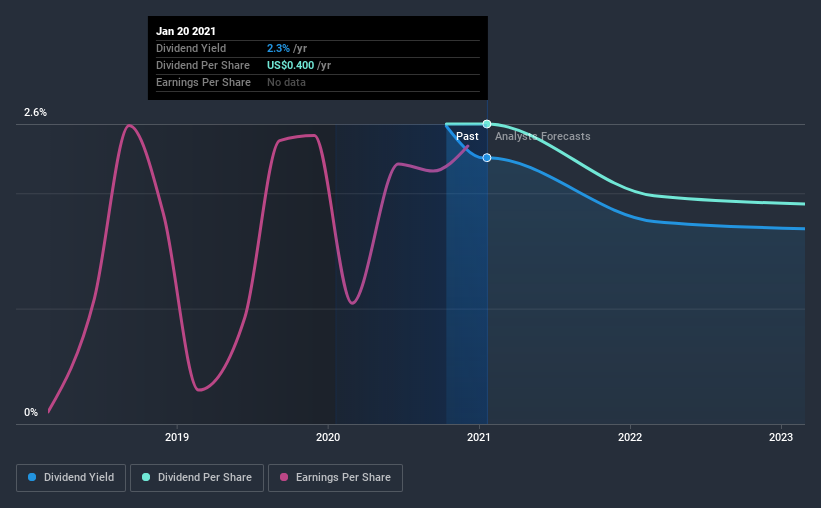Why You Might Be Interested In Albertsons Companies, Inc. (NYSE:ACI) For Its Upcoming Dividend
Readers hoping to buy Albertsons Companies, Inc. (NYSE:ACI) for its dividend will need to make their move shortly, as the stock is about to trade ex-dividend. This means that investors who purchase shares on or after the 25th of January will not receive the dividend, which will be paid on the 10th of February.
Albertsons Companies's next dividend payment will be US$0.10 per share. If you buy this business for its dividend, you should have an idea of whether Albertsons Companies's dividend is reliable and sustainable. As a result, readers should always check whether Albertsons Companies has been able to grow its dividends, or if the dividend might be cut.
Check out our latest analysis for Albertsons Companies
Dividends are usually paid out of company profits, so if a company pays out more than it earned then its dividend is usually at greater risk of being cut. Albertsons Companies has a low and conservative payout ratio of just 5.4% of its income after tax. That said, even highly profitable companies sometimes might not generate enough cash to pay the dividend, which is why we should always check if the dividend is covered by cash flow. The good news is it paid out just 4.1% of its free cash flow in the last year.
It's encouraging to see that the dividend is covered by both profit and cash flow. This generally suggests the dividend is sustainable, as long as earnings don't drop precipitously.
Click here to see the company's payout ratio, plus analyst estimates of its future dividends.
Have Earnings And Dividends Been Growing?
Stocks with flat earnings can still be attractive dividend payers, but it is important to be more conservative with your approach and demand a greater margin for safety when it comes to dividend sustainability. If earnings fall far enough, the company could be forced to cut its dividend. That explains why we're not overly excited about Albertsons Companies's flat earnings over the past three years. We'd take that over an earnings decline any day, but in the long run, the best dividend stocks all grow their earnings per share. Growth has been anaemic. Yet with more than 75% of its earnings being kept in the business, there is ample room to reinvest in growth or lift the payout ratio - either of which could increase the dividend.
This is Albertsons Companies's first year of paying a dividend, so it doesn't have much of a history yet to compare to.
The Bottom Line
From a dividend perspective, should investors buy or avoid Albertsons Companies? Earnings per share have been flat over this time, but we're intrigued to see that Albertsons Companies is paying out less than half its earnings and cash flow as dividends. This is interesting for a few reasons, as it suggests management may be reinvesting heavily in the business, but it also provides room to increase the dividend in time. We would prefer to see earnings growing faster, but the best dividend stocks over the long term typically combine strong earnings per share growth with a low payout ratio, and Albertsons Companies is halfway there. Overall we think this is an attractive combination and worthy of further research.
On that note, you'll want to research what risks Albertsons Companies is facing. For instance, we've identified 4 warning signs for Albertsons Companies (1 is potentially serious) you should be aware of.
We wouldn't recommend just buying the first dividend stock you see, though. Here's a list of interesting dividend stocks with a greater than 2% yield and an upcoming dividend.
This article by Simply Wall St is general in nature. It does not constitute a recommendation to buy or sell any stock, and does not take account of your objectives, or your financial situation. We aim to bring you long-term focused analysis driven by fundamental data. Note that our analysis may not factor in the latest price-sensitive company announcements or qualitative material. Simply Wall St has no position in any stocks mentioned.
Have feedback on this article? Concerned about the content? Get in touch with us directly. Alternatively, email editorial-team (at) simplywallst.com.

 Yahoo Finance
Yahoo Finance 
